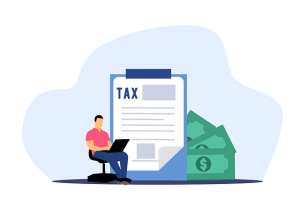Blog
Posted April 24, 2025
Never Struggle with Tax Bills Again – Budgeting Tips
For many small business owners and self-employed professionals across the UK, tax season brings unnecessary stress and financial strain. At Whitesides Chartered Accountants, we’ve seen many clients caught out by unexpected tax bills, struggling to find funds at the last minute. But it doesn’t have to be this way. With proper planning and budgeting, tax time can simply become another predictable business expense.
Why Tax Bills Catch People Out
Before diving into solutions, it’s worth understanding why tax bills become problematic:
- Irregular income patterns make consistent saving difficult
- Delaying tax preparations until the January deadline approaches
- Not setting aside sufficient funds throughout the year
- Underestimating tax liabilities, particularly for growing businesses
- Using funds earmarked for tax to cover other business expenses
Practical Budgeting Strategies
Open a Dedicated Tax Account
Perhaps the simplest yet most effective strategy is opening a separate business savings account specifically for tax liabilities. Each time you receive payment:
- Calculate the approximate tax due (typically 20-40% depending on your tax bracket)
- Transfer this amount immediately to your tax account
- Consider this money untouchable for day-to-day expenses
This approach creates a psychological barrier between operating capital and tax obligations, preventing the common “borrowing from tax money” habit that often leads to problems.
 Implement the 30% Rule
Implement the 30% Rule
For many sole traders and small business owners, setting aside a flat 30% of all income provides a reasonable buffer for tax obligations. While your actual tax rate may vary, this conservative approach helps cover:
- Income Tax
- National Insurance contributions
- Any VAT obligations (if registered)
- A small buffer for unexpected liabilities
Adjust this percentage based on your specific circumstances and previous tax returns.
Quarterly Tax Reviews
Don’t wait until January to understand your tax position. Schedule quarterly reviews (June, September, December, March) to:
- Calculate year-to-date income and projected tax
- Verify sufficient funds are set aside
- Make adjustments if your income has increased significantly
- Identify potential deductions or tax-planning opportunities
These regular check-ins prevent nasty surprises and give you time to address shortfalls gradually.
Leverage Technology
Modern accounting software can dramatically simplify tax budgeting:
- Cloud accounting platforms provide real-time tax liability estimates
- Receipt-tracking apps ensure you don’t miss legitimate business expenses
- Cash flow forecasting tools help predict future tax obligations
- Automated savings features can move predetermined percentages to tax savings
The investment in good software typically pays for itself through stress reduction and tax efficiency.
Consider Tax Payment on Account
For those who have been self-employed for more than a year, HMRC requires payments on account – advance payments toward your next tax bill. While this initially feels like paying extra, it ultimately helps spread tax obligations throughout the year.
If your income fluctuates significantly year-to-year, remember you can apply to reduce these payments if you expect your tax liability to be lower than the previous year.
When to Seek Professional Help
While these strategies work well for many businesses, certain situations warrant professional guidance:
- When your business structure changes (e.g., sole trader to limited company)
- During periods of significant growth or revenue increase
- If you’ve fallen behind on tax payments and need to negotiate with HMRC
- When considering major investments or expense decisions with tax implications
Final Thoughts
Tax doesn’t need to be taxing, as the old saying goes! With consistent attention to your tax obligations throughout the year, what was once a dreaded annual crisis can become just another well-managed aspect of your business finances.
Need personalised advice on managing your tax budgeting? Our team of experienced accountants is here to help. Contact us today for a consultation.
This blog post is intended as general guidance only and should not be relied upon as professional advice. Tax regulations change regularly, and individual circumstances vary. Please consult with a qualified accountant regarding your specific situation.
SERVICES
LATEST NEWS
CATEGORIES
- Blog (160)
- Business Advice (56)
- Just For Fun (17)
- Tax Tips (45)
- Video (8)











